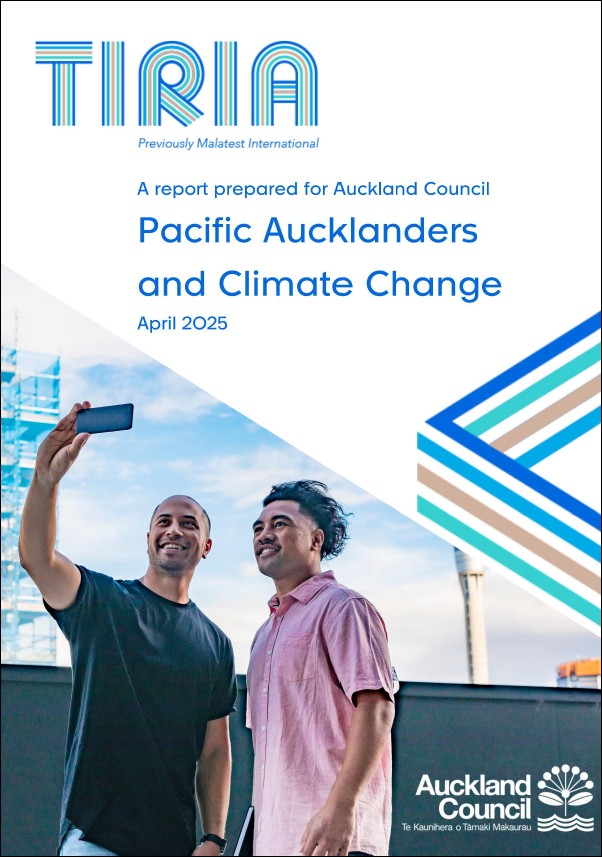Pacific Aucklanders and climate change
Author:
TIRIASource:
Auckland Council | TIRIAPublication date:
2025Topics:
Environment ,PeopleExecutive summary
Auckland’s climate is changing, and while everyone is affected, some communities are more exposed to its effects than others. Pacific peoples in Aotearoa, New Zealand (New Zealand) have been identified in current national and local government climate policies as facing greater exposure to climate risks due to socioeconomic factors, including income levels, housing conditions, and employment patterns. The Auckland Council’s Te Tāruke-ā-Tāwhiri: Climate Action Plan (2019), for example, identifies Pacific peoples as a priority group needing support for climate change initiatives. However, there are gaps in understanding how Pacific Aucklanders perceive climate change and its impacts. This qualitative study investigates Pacific Aucklanders' knowledge, awareness and understanding of climate change impacts to inform more effective and culturally relevant climate strategies.
Research approach and data sources
This study utilised a qualitative research approach grounded in Pacific research methodologies, ensuring cultural relevance and safety for participants. Data collection, conducted between September and December 2024, involved a rapid literature review, interviews with seven stakeholders (e.g. Pacific climate change experts and mana whenua), six fono/focus groups and seven paired interviews with 41 Pacific Aucklanders. The research was guided by Pacific frameworks which emphasise collective knowledge-sharing, as discussed below.
Research findings
The results highlight the complex climate change challenges faced by Pacific Aucklanders, shared by the intersecting factors of socioeconomic status, cultural frameworks and Pacific transnational connections. The key findings include:
- Diverse range of knowledge and awareness about climate change. While community participants acknowledged climate change as an issue, their understanding of its causes and impacts varied widely. This finding is consistent with prior research, which suggests that awareness may be limited due to the gradual nature of climate impacts, cultural interpretations of environmental changes, and socioeconomic barriers that influence motivation to act. The findings highlight gaps in knowledge and misinformation that influence Pacific communities’ engagement in climate action.
- Pacific Aucklanders access climate information from multiple sources. The most accessed sources include social media platforms such as TikTok and Instagram, traditional media sources (particularly TV news) as well as friends and family. Schools, educational institutions, research papers and official reports were also identified as sources of information but were accessed by a smaller number of community participants. While social media platforms were the most accessible, there were mixed views about the trustworthiness of information shared via social media. In comparison, traditional media sources were seen as more reliable and trustworthy.
- Climate change is seen as an issue for the Pacific region and less so for Auckland. Almost all participant perceptions, understandings, and awareness of climate change were framed in relation to the Pacific region and their home islands, with most participants finding it difficult to identify climate change issues
and impacts in Auckland. Pacific Aucklanders expressed strong concern for climate change in the Pacific region, particularly for family members facing displacement, while their immediate priorities centre on economic challenges and the cost of living. - Pacific traditional knowledge and practices have limited relevance in an Auckland context. Interviewed stakeholders highlighted the relevance of Pacific traditional climate change practices, knowledge, and responses to Pacific environments, while recognising that mātauranga Māori was more appropriate and significant in the context of Auckland’s urban environment. Community participants discussed traditional practices, such as sustainable food sourcing and methods (seasonal fishing and sourcing only what is needed), climate-resilient housing (e.g., traditional Samoan fale), and coastal protection through planting, but struggled to identify which of them could be relevant to Auckland.
- Climate action enablers and barriers. Enablers for climate action include community-led solutions informed by cultural contexts, incentivising climate-friendly behaviours and making climate solutions affordable to address financial constraints and intersectoral collaboration, including Pacific service providers and leaders. Barriers were identified as economic constraints, lack of reliable transport alternatives to private car use and climate information, which is complex and hard to understand.
Opportunities for Auckland Council
- Increase climate awareness. Develop Pacific-specific education strategies informed by cultural frameworks and using creative modes such as storytelling led by Pacific community leaders
- Reframe climate-friendly behaviours as both affordable and sustainable. Emphasise the co-benefits of climate action.
- Support Pacific-led climate action by fostering partnerships between local government, businesses, service providers and community leaders to create inclusive, community-driven solutions. This will help to increase Pacific engagement in both climate action design and implementation.
Auckland Council, TIRIA May 2025
